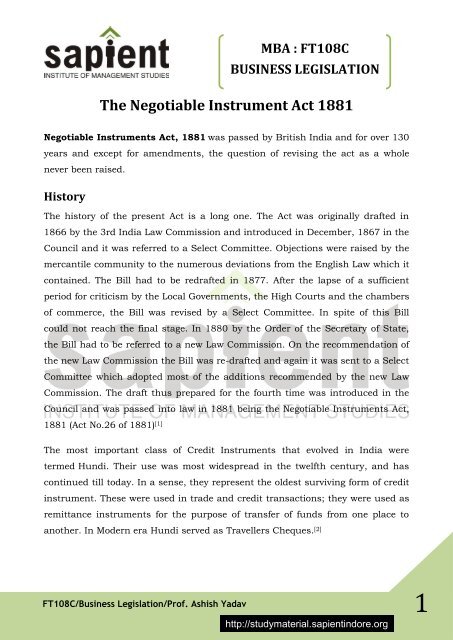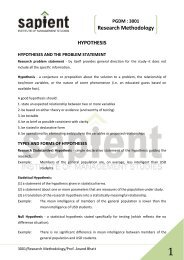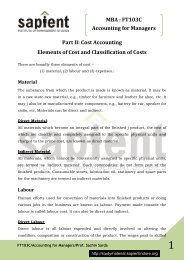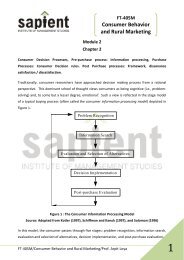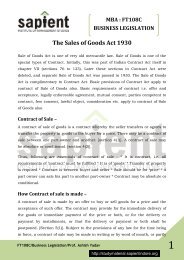The Negotiable Instrument Act 1881
The Negotiable Instrument Act 1881
The Negotiable Instrument Act 1881
Create successful ePaper yourself
Turn your PDF publications into a flip-book with our unique Google optimized e-Paper software.
MBA : FT108C<br />
BUSINESS LEGISLATION<br />
<strong>The</strong> <strong>Negotiable</strong> <strong>Instrument</strong> <strong>Act</strong> <strong>1881</strong><br />
<strong>Negotiable</strong> <strong>Instrument</strong>s <strong>Act</strong>, <strong>1881</strong> was passed by British India and for over 130<br />
years and except for amendments, the question of revising the act as a whole<br />
never been raised.<br />
History<br />
<strong>The</strong> history of the present <strong>Act</strong> is a long one. <strong>The</strong> <strong>Act</strong> was originally drafted in<br />
1866 by the 3rd India Law Commission and introduced in December, 1867 in the<br />
Council and it was referred to a Select Committee. Objections were raised by the<br />
mercantile community to the numerous deviations from the English Law which it<br />
contained. <strong>The</strong> Bill had to be redrafted in 1877. After the lapse of a sufficient<br />
period for criticism by the Local Governments, the High Courts and the chambers<br />
of commerce, the Bill was revised by a Select Committee. In spite of this Bill<br />
could not reach the final stage. In 1880 by the Order of the Secretary of State,<br />
the Bill had to be referred to a new Law Commission. On the recommendation of<br />
the new Law Commission the Bill was re-drafted and again it was sent to a Select<br />
Committee which adopted most of the additions recommended by the new Law<br />
Commission. <strong>The</strong> draft thus prepared for the fourth time was introduced in the<br />
Council and was passed into law in <strong>1881</strong> being the <strong>Negotiable</strong> <strong>Instrument</strong>s <strong>Act</strong>,<br />
<strong>1881</strong> (<strong>Act</strong> No.26 of <strong>1881</strong>) [1]<br />
<strong>The</strong> most important class of Credit <strong>Instrument</strong>s that evolved in India were<br />
termed Hundi. <strong>The</strong>ir use was most widespread in the twelfth century, and has<br />
continued till today. In a sense, they represent the oldest surviving form of credit<br />
instrument. <strong>The</strong>se were used in trade and credit transactions; they were used as<br />
remittance instruments for the purpose of transfer of funds from one place to<br />
another. In Modern era Hundi served as Travellers Cheques. [2]<br />
FT108C/Business Legislation/Prof. Ashish Yadav<br />
http://studymaterial.sapientindore.org c<br />
1
MBA : FT108C<br />
BUSINESS LEGISLATION<br />
Types of <strong>Negotiable</strong> <strong>Instrument</strong>s<br />
According to Section of the <strong>Negotiable</strong> <strong>Instrument</strong>s <strong>Act</strong> means "A negotiable<br />
instrument means a promissory note, bill of exchange or cheque payable either to<br />
order or to bearer.' [3] But in Section 1, it is also described that Local extent,<br />
Saving of usage relating to hundis, etc., Commencement. -It extends to the<br />
whole of India but nothing herein contained affects the Indian Paper Currency<br />
<strong>Act</strong>, 1871, Section 2, or affects any local usage relating to any instrument in an<br />
oriental language. Provided that such usages may be excluded by any words in<br />
the body of the instrument, which indicate and intention that the legal relations<br />
of the parties thereto shall be governed by this <strong>Act</strong>; and it shall come into force<br />
on the first day of March, 1882. [3]<br />
Modern era and <strong>Negotiable</strong> <strong>Instrument</strong>s<br />
With the growth of the Economy, <strong>Negotiable</strong> <strong>Instrument</strong>s have given the new<br />
dimensions to the commercial and corporate world. Now people prefer to carry a<br />
small piece of paper known as Cheque rather than carrying the currency worth<br />
the value of the Cheque. Before 1988 there being no provision to restrain the<br />
person issuing the Cheque without having sufficient funds in his account. Of<br />
course on Dishonoured cheque there is a civil liability accrued. However in reality<br />
it takes a long time to recover the money. In order to ensure promptitude and<br />
remedy against the defaulters of the <strong>Negotiable</strong> <strong>Instrument</strong> a criminal remedy of<br />
penalty was inserted in <strong>Negotiable</strong> <strong>Instrument</strong>s <strong>Act</strong>, <strong>1881</strong> by amending it with<br />
<strong>Negotiable</strong> <strong>Instrument</strong>s <strong>Act</strong>, 1988. [3]<br />
With the insertion of these provisions in the <strong>Act</strong> the situation certainly improved<br />
and the instances of dishonour have relatively come down but on account of<br />
application of different interpretative techniques by different High Courts on<br />
different provisions of the <strong>Act</strong> it further compounded and complicated the<br />
situation although on dishonour of cheques the trends of the verdicts of<br />
theSupreme Court of India unequivocally demonstrate that there is subconscious<br />
FT108C/Business Legislation/Prof. Ashish Yadav<br />
http://studymaterial.sapientindore.org c<br />
2
MBA : FT108C<br />
BUSINESS LEGISLATION<br />
judicial pressure in the mind of the Judges which leans heavily in favour of the<br />
holder of the cheque.<br />
Having regard to the working of these penal provisions on dishonour of cheques<br />
and the bottlenecks that have surfaced in strictly implementing these provisions,<br />
Parliament enacted the <strong>Negotiable</strong> <strong>Instrument</strong>s (Amendment and Miscellaneous<br />
Provisions) <strong>Act</strong>, 2002 (55 of 2002), which is intended to plug the loopholes. This<br />
amendment <strong>Act</strong> inserts five new sections from 143 to 147 touching various limbs<br />
of the parent <strong>Act</strong> and Cheque truncation through digitally were also included and<br />
the amendment <strong>Act</strong> has been recently brought into force on Feb. 6, 2003. [3]<br />
Statutory Definitions<br />
Some of the important definitions of the <strong>Act</strong>, which are important are:<br />
Section 6 - Cheque [4]<br />
A cheque is bill of exchange drawn on a specified banker and not expressed to be<br />
payable otherwise than on demand and it includes the electronic image of a<br />
truncated cheque and a cheque in the electronic form.<br />
Explanation I –<br />
For the purposes of this section, the expressions-<br />
(a)<br />
a cheque in the electronic form means a cheque which contains the<br />
exact mirror image of a paper cheque, and is generated, written and signed<br />
in a secure system ensuring the minimum safety standards with the use of<br />
digital signature (with or without biometrics signature) and asymmetric<br />
crypto system;<br />
(b) a truncated cheque means a cheque which is truncated during the course<br />
of a clearing cycle, either by the clearing house or by the bank whether<br />
paying or receiving payment, immediately on generation of an electronic<br />
image for transmission, substituting the further physical movement of the<br />
cheque in writing.<br />
FT108C/Business Legislation/Prof. Ashish Yadav<br />
http://studymaterial.sapientindore.org c<br />
3
MBA : FT108C<br />
BUSINESS LEGISLATION<br />
Explanation II –<br />
For the purposes of this section, the expression clearing house means the<br />
clearing house managed by the Reserve Bank of India or a clearing house<br />
recognised as such by the Reserve Bank of India.<br />
Section 13 - <strong>Negotiable</strong> <strong>Instrument</strong>s<br />
(1) <strong>Negotiable</strong> instrument. A <strong>Negotiable</strong> <strong>Instrument</strong> means a promissory<br />
note, bill of exchange or cheque payable either to order or to bearer.<br />
Explanation (i)-<br />
A promissory note, bill of exchange or cheque is payable to order which is<br />
expressed to be so payable or which is expressed to be payable to a<br />
particular person, and does not contain words prohibiting transfer or<br />
indicating an intention that it shall not be transferable.<br />
Explanation (ii)-<br />
A promissory note, bill of exchange or cheque is payable to bearer which is<br />
expressed to be so payable or on which the only or last endorsement is an<br />
endorsement in blank.<br />
Explanation (iii)-<br />
Where a promissory note, bill of exchange or cheque, either originally or by<br />
endorsement, is expressed to be payable to the order of a specified person,<br />
and not to him or his order, it is nevertheless payable to him or his order at<br />
his option.<br />
(2) A negotiable instrument may be made payable to two or more payees<br />
jointly, or it may be made payable in the alternative to one of two, or one or<br />
-some of several payees.<br />
Section 123 - Cheque Crossed Generally<br />
FT108C/Business Legislation/Prof. Ashish Yadav<br />
http://studymaterial.sapientindore.org c<br />
4
MBA : FT108C<br />
BUSINESS LEGISLATION<br />
Where a cheque bears across its face an addition of the words and company or<br />
any abbreviation thereof, between two parallel transverse lines, or of two parallel<br />
transverse lines simply, either with or without the words, not negotiable, that<br />
addition shall be deemed a crossing, and the cheque shall be deemed to be<br />
crossed generally.<br />
Section 124 - Cheque crossed specially<br />
Where a cheque bears across its face an addition of the name of a banker, either<br />
with or without the words not negotiable, that addition shall be deemed a<br />
crossing, and the cheque shall be deemed to be crossed specially, and to be<br />
crossed to that banker.<br />
Section 126 Cheque crossed specially<br />
Where a cheque is crossed generally, the banker, on whom it is drawn shall not<br />
pay it otherwise than to a banker.<br />
Payment of cheque crossed specially- Where a cheque is crossed specially, the<br />
banker on whom it is drawn shall not pay it otherwise than to the banker to<br />
whom it is crossed, or his agent, for collection.<br />
Section 130 Cheque bearing Not <strong>Negotiable</strong><br />
A person taking a cheque crossed generally or specially, bearing in either case<br />
the words not negotiable, shall not have, and shall not be capable of giving, a<br />
better title to the cheque than that which the person from whom he took it had.<br />
Dishonour of certain Cheques for Insufficiency of Funds in<br />
Accounts<br />
Section 138 to 142 of Chapter XVII, of <strong>Negotiable</strong> <strong>Instrument</strong> <strong>Act</strong>, <strong>1881</strong>, deals<br />
with dishonour of cheque. <strong>The</strong> main object is to introduce financial discipline in<br />
business dealings. Prior to insertion of 138 of NI, a dishonored cheque's left the<br />
person aggrieved with the only remedy of filing a claim. <strong>The</strong> remedy available in<br />
civil court is a long drawn matter and an unscrupulous drawer normally takes<br />
FT108C/Business Legislation/Prof. Ashish Yadav<br />
http://studymaterial.sapientindore.org c<br />
5
MBA : FT108C<br />
BUSINESS LEGISLATION<br />
various pleas to defeat the genuine claim of the payee. In 1988, Chapter XVII<br />
inserted and added Section 138 to 142. Object of the amendment is to held<br />
person criminally responsible for his acts in Commercial transactions Trade and<br />
Business dealings with people carried out carelessly or without sense of<br />
responsibility.<br />
Section 138 - Dishonour of cheque for insufficiency, etc., of funds in the<br />
accounts<br />
Where any cheque drawn by a person on an account maintained by him with a<br />
banker for payment of any amount of money to another person from out of that<br />
account for the discharge, in whole or in part, of any debt or other liability, is<br />
returned by the bank unpaid, either because of the amount of money standing to<br />
the credit of that account is insufficient to honour the cheque or that it exceeds<br />
the amount arranged to be paid from that account by an agreement made with<br />
that bank, such person shall be deemed to have committed an offence and shall,<br />
without prejudice to any other provision of this <strong>Act</strong>, be punished with<br />
imprisonment for a term which may be extended to two years, or with fine which<br />
may extend to twice the amount of the cheque, or with both;<br />
Provided that nothing contained in this section shall apply unless-<br />
(a)<br />
(b)<br />
the cheque has been presented to the bank within a period of three months<br />
from the date on which it is drawn or within the period of its validity,<br />
whichever is earlier;<br />
the payee or the holder in due course of the cheque, as the case may be,<br />
makes a demand for the payment of the said amount of money by giving a<br />
notice in writing, to the drawer of the cheque within thirty days of the<br />
receipt of information by him from the bank regarding the return of the<br />
cheque as unpaid; and<br />
(c) the drawer of such cheque fails to make the payment of the said amount of<br />
money to the payee or as the case may be, to the holder in due course of<br />
FT108C/Business Legislation/Prof. Ashish Yadav<br />
http://studymaterial.sapientindore.org c<br />
6
MBA : FT108C<br />
BUSINESS LEGISLATION<br />
the cheque within 30 days of the receipt of the said notice.(EDITED BY RP<br />
ON 14.08.2012)<br />
Explanation –<br />
For the purposes of this section, debt or other liability means a legally<br />
enforceable debt or other liability.<br />
Another very important section is presumptions as to <strong>Negotiable</strong> <strong>Instrument</strong>s<br />
under Section 118 of the <strong>Act</strong>.<br />
Section 118 - Presumptions as to <strong>Negotiable</strong> <strong>Instrument</strong>s<br />
Until the contrary is proved, the following presumptions shall be made:<br />
(a) of consideration. -<br />
that every negotiable instrument was made or drawn for consideration, and<br />
that every such instrument, when it has been accepted, indorsed,<br />
negotiated or transferred, was accepted, indorsed, negotiated or transferred<br />
for consideration;<br />
(b) as to date. –<br />
that every negotiable instrument bearing a date was made or drawn on<br />
such date;<br />
(c) as to time of acceptance. –<br />
that every accepted bill of exchange was accepted within a reasonable time<br />
after its date and before its maturity;<br />
(d) as to time of transfer. –<br />
that every transfer of a negotiable instrument was made before its<br />
maturity;<br />
(e) as to order of indorsements. –<br />
that the indorsements appearing upon a negotiable instrument were made<br />
in the order in which they appear thereon;<br />
(f) as to stamp. –<br />
that a lost promissory note, bill of exchange or cheque was duly stamped;<br />
(g) that holder is a holder in due course. –<br />
FT108C/Business Legislation/Prof. Ashish Yadav<br />
http://studymaterial.sapientindore.org c<br />
7
MBA : FT108C<br />
BUSINESS LEGISLATION<br />
that the holder of a negotiable instrument is a holder in due course;<br />
Provided that, where the instrument has been obtained from its lawful owner, or<br />
from any person in lawful custody thereof, by means of an offence or fraud, or<br />
has been obtained from the maker or acceptor thereof by means of an offence or<br />
fraud, or for unlawful consideration, the burden of proving that the holder is a<br />
holder in due course lies upon him.<br />
Five Ingredients of the offence under Section 138<br />
It is manifest that to constitute an offence under Section 138 of the <strong>Act</strong>, the<br />
following ingredients are required to be fulfilled:<br />
<br />
<br />
<br />
<br />
<br />
<br />
a person must have drawn a cheque on an account maintained by him in a<br />
bank for payment of a certain amount of money to another person from out<br />
of that account<br />
<strong>The</strong> cheque should have been issued for the discharge, in whole or in part,<br />
of any debt or other liability;<br />
that cheque has been presented to the bank within a period of three<br />
months from the date on which it is drawn or within the period of its<br />
validity whichever is earlier;<br />
that cheque is returned by the bank unpaid, either because of the amount<br />
of money standing to the credit of the account is insufficient to honour the<br />
cheque or that it exceeds the amount arranged to be paid from that<br />
account by an agreement made with the bank;<br />
the payee or the holder in due course of the cheque makes a demand for<br />
the payment of the said amount of money by giving a notice in writing, to<br />
the drawer of the cheque, within 30 days of the receipt of information by<br />
him from the bank regarding the return of the cheque as unpaid;<br />
the drawer of such cheque fails to make payment of the said amount of<br />
money to the payee or the holder in due course of the cheque within 30<br />
days of the receipt of the said notice<br />
FT108C/Business Legislation/Prof. Ashish Yadav<br />
http://studymaterial.sapientindore.org c<br />
8


